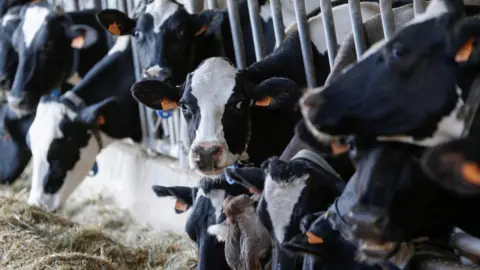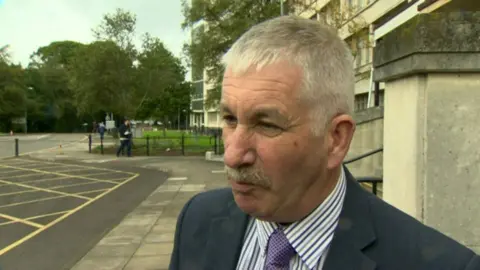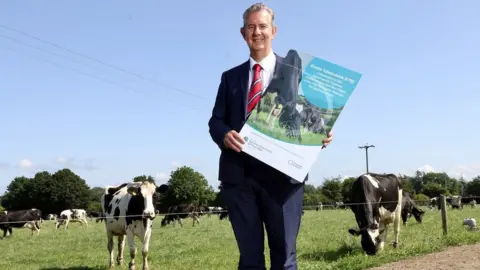Ulster Farmers' Union will not support bovine TB strategy
 Reuters
ReutersThe Ulster Farmers' Union (UFU) has said it will not support the proposed bovine TB (bTB) strategy in its current form.
In July, Agriculture Minister Edwin Poots launched a consultation into the "Next Steps of the bTB Eradication Strategy for Northern Ireland".
He said the plans were far-reaching and based on science.
Some of the most controversial aspects of the strategy have been put out for consultation.
But the largest farmers' group in Northern Ireland has said it cannot support all of the proposals.
Victor Chestnutt, president of the UFU said: "Countless hours have been spent on our livestock committee and our animal health committee to come to this decision.
"We'd have liked to be able to fully support this consultation document.
"But it has in it things that would have the ability to wipe farmers out of business.
"And we will not stand by while farmers get wiped out of business."
'Kicking a man when he's down'
In the bTB strategy, the minister outlines a number of possible steps to deal with bTB.
One is a reduction in the compensation paid to farmers - farmers who lose animals to bTB currently get 100% of the market value.
The strategy proposes to cut it to 75% of market value and it would be capped at £5,000 per animal.
Mr Chestnutt said that suggestion is like "kicking a man when he's down".
"Cutting compensation really hits a farmer when he gets bTB on his farm through no fault of his own," he said.
"It's outside his control.
"We offered to create a levy across all livestock farmers in Northern Ireland and DAERA [Department of Agriculture, Environment and Rural Affairs] need to give that thought.
"We won't accept inflicting pain on a farmer who is dealing with the devastating loss because of an outbreak of bTB.
"We need to negotiate on this."

The cap on the compensation per animal is also something the UFU wants to avoid.
Mr Chestnutt said the move would obliterate the top level of breeding here.
"On the department's own figures the cap will achieve a saving of £104,000 out of a £40m scheme," he said.
"The effect of that cap would hit the very top of the pyramid of cattle breeding in Northern Ireland.
"A cap of £5,000, would mean after £5,000 you are on your own so it would make people nervous to invest in the best genetics.
"So in effect for a relatively small amount of money we are destroying the potential for Northern Ireland to keep punching above its weight in livestock genetics."
A badger cull, to be paid for by farmers, is also part of the consultation.
Farmers have long campaigned for wildlife intervention to help stop the spread of bTB - but wildlife groups are angry it is being considered.
The UFU said it accepted the proposal for wildlife intervention, but it would not support how the strategy proposed funding it.
"Wildlife intervention, unfortunately is necessary," Mr Chestnutt said.
"The easiest way of cutting the cost to the public purse is cutting the levels of disease.
"But our members feel that bTB already costs the farmers so much - why should they have to pay for the wildlife intervention too."
 DAERA
DAERAThe agriculture minister said he wanted to hear the views from farmers and as "many people as possible to respond to the consultation".
"We can't go on doing what we're doing on TB," Mr Poots said.
He added that "hundreds of millions of pounds of public money" had been spent "over the course of the past 40 years doing the same thing on bTB".
"I'm laying out the challenge that we need to change," he said.
"Farmers need to change, change in how we deal with wildlife.
"We have the science to back us up on this.
"People need to reflect on things and how we can move forward and have a healthier population of cattle and a healthier more biodiverse wildlife population."
The consultation period is open now and will run until 10 September.
The consultation documents can be accessed on the DAERA website.
